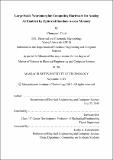Large-scale neuromorphic computing hardware for analog AI enabled by epitaxial random access memory
Author(s)
Choi, Chanyeol.
Download1142635152-MIT.pdf (1.524Mb)
Other Contributors
Massachusetts Institute of Technology. Department of Electrical Engineering and Computer Science.
Advisor
Jeehwan Kim.
Terms of use
Metadata
Show full item recordAbstract
A neuromorphic computing on memristor-based crossbars is one of promising next generation analog computing methods since it features fast switching speed, extremely small cell footprint, low energy consumption for matrix-vector multiplication, capability of both storage and computing, three-dimensionality, and many analog weight steps. Although there have been intensive studies on the development of an analog memristive device and its large-scale crossbar to implement neuromorphic hardware systems for deep neural networks, only limited approaches, such as inference task, were suggested due to spatial/temporal variations and nonlinear/step-limited weight update properties. In order to address those issues, this thesis presents epitaxial random access memory and relevant techniques at material-, device-, array-, architecture-, algorithm-level. The proposed methods have great potential to improve device performance and relax the large-scale system-level requirements for analog AI computing.
Description
This electronic version was submitted by the student author. The certified thesis is available in the Institute Archives and Special Collections. Thesis: S.M., Massachusetts Institute of Technology, Department of Electrical Engineering and Computer Science, 2019 Cataloged from student-submitted PDF version of thesis. Includes bibliographical references (pages [47]-50).
Date issued
2019Department
Massachusetts Institute of Technology. Department of Electrical Engineering and Computer SciencePublisher
Massachusetts Institute of Technology
Keywords
Electrical Engineering and Computer Science.